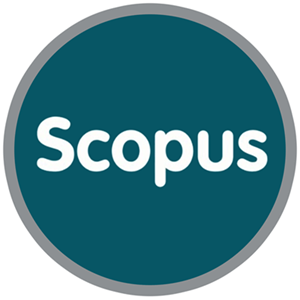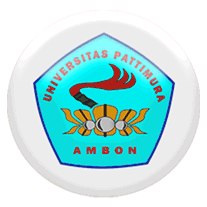DESIGN CONTROL OF SURFACE MARINE VEHICLE USING DISTURBANCE COMPENSATING MODEL PREDICTIVE CONTROL (DC-MPC)
Abstract
This research studied ship motion control by considering four degrees of freedom (DoF): yaw, roll, sway, and surge in which comprehensive mathematical modeling forming a nonlinear differential equation. Furthermore, this research also investigated solutions for fundamental yet challenging steering problems of ship maneuvering using advanced control method: Disturbance Compensating Model Predictive Control (DC-MPC) method, which based on Model Predictive Control (MPC). The DC-MPC allows optimizing a compensated control then consider sea waves as the environmental disturbances. Those sea waves influence the control and also becomes one of the constraints for the system. The simulation compared the varying condition of Horizon Prediction (Np) and another method showing that the DC-MPC can manage well the given disturbances while maneuvering in certain Horizon Prediction. The results revealed that the ship is stable and follows the desired trajectory
Downloads
References
R. Fraga and L. Sheng, An Effective State-Space Feedback Autopilot for Ship Motion Control, vol. 2, No. 2, , page 62-69, 2012.
Developer, M. BPPT “Kembangkan Kapal Selam Miniâ€. Media Indonesia., https://mediaindonesia.com/read/detail/120093-bppt-kembangkan-kapal-selam-mini. [accessed August 30, 2017].
T. I. Fossen, Guidance and Control of Ocean Vehicles (John Wiley and Son, 1999).
Z. Yu and J. Amdahl, Full six degrees of freedom coupled dynamic simulation of ship collision and grounding, Marine Structures, vol. 47, pp 1-22, May 2016.
DOI: doi.org/10.1016/j.marstruc.2016.03.001
R. L. Levin and L. Larsson, Sailing yacht performance prediction based on coupled CFD and rigid body 6 degrees of freedom, Ocean Engineering, vol. 144, pp. 362-373, November, 2017.
DOI: doi.org/10.1016/j.oceaneng.2017.09.052
E. W. McGookin, D. J. Murray-Smith, Y. Li, and T. I. Fossen, Ship steering control system optimisation algorithms, Control Engineering Practice, vol. 8, no. 4, pp 429-443, 2000.
J. Wu, H. Peng, K. Ohtsu, G. Kitagawa, and T. Itoh, Ship's tracking control based on nonlinear time, Applied Ocean Research, vol. 36, pp 1-11, June 2012.
DOI: doi.org/10.1016/j.apor.2012.01.004
J. Velagic, Z. Vukic, and E. Omerdic, Adaptive fuzzy ship autopilot for track-keeping, IFAC Proceedings Volumes, Volume 33, Issue 21, pp 129-134, August 2000.
DOI: doi.org/10.1016/S1474-6670(17)37063-5
J. Du, C. Guo, S. Yu and Y. Zhao, Adaptive Autopilot Design of Time-Varying Uncertain Ships With Completely Unknown Control Coefficient, IEEE Journal of Oceanic Engineering, vol. 32, no. 2, pp 346-352, April 2007,
DOI 10.1109/JOE.2007.893684.
Y. Wang and S. Boyd, Fast Model Predictive Control Using Online Optimization. IEEE Transaction on Control Systems Technology, Vol. 18, No. 2, pp 267-278, March 2010.
A. Witkowska, M. Tomera, and R. Smierzchalski, A Backstepping approach to ship course control, Int. J. Appl. Math. Comput. Sci., Vol. 17, No. 1, pp 73-85, 2007.
DOI: 10.2478/v10006-007-0007-2
H. P. Guo & Z. J. Zou, System-based investigation on 4-DOF ship maneuvering with hydrodynamic derivatives determined by RANS simulation of captive model tests. Applied Ocean Research, Volume 68, pp 11-25, 2017.
DOI: doi.org/10.1016/j.apor.2017.08.006
Z. Li, J. Sun and S. Oh, Path following for marine surface vessels with rudder and roll constraints: An MPC approach, 2009 American Control Conference, pp 3611-3616, June 2009.
DOI: 10.1109/ACC.2009.5160302.
Purnawan, Heri & Asfihani, Tahiyatul & Adzkiya, Dieky & Subchan, Disturbance compensating model predictive control for warship heading control in missile firing mission. Journal of Physics: Conference Series, vol. 1108, pp. 1-6, 2018
DOI: 10.1088/1742-6596/1108/1/012035
S.S. Tabatabaei, M. J., Yazdanpanah, and M.S., Tavazoei, Formulation and numerical solution for fractional order time optimal control problem using pontryagin’s minimum principle, IFAC-Papers Online, Vol. 50, Issue 1, pp 9224-9229, July 2017. DOI: https://doi.org/10.1016/j.ifacol.2017.08.1280
S. Cahyaningtias and S. Subchan, Application of Pontryagin’s minimum principle in optimum time of missile manoeuvring, Cauchy Journal, vol. 4, no. 3, pp 107-111, November 2016.
DOI: https://doi.org/10.18860/ca.v4i3.3534
S. Xie, X. Hu, Z. Xin and J. Brighton, Pontryagin’s minimum principle based model predictive control of energy management for a plug-in hybrid electric bus, Applied Energy, Vol. 236, pp 893-905, February 2019.
DOI: https://doi.org/10.1016/j.apenergy.2018.12.032
S. Khongkhachat and S. Khomfoi, A sliding mode control strategy for a grid-supporting and grid-forming power converter in autonomous AC microgrids, International Review of Electrical Engineering, Vol. 14, No. 2, pp 118, April 2019.
DOI: https://doi.org/10.15866/iree.v14i2.16331.
M. A. Mossa and A. A. Z. Diab, Effective model predictive control approach for faulty induction motor drive, International Review of Electrical Engineering, Vol. 14, No. 5, pp 314-327, September 2019.
DOI: https://doi.org/10.15866/iree.v14i4.16837
J. Qu, Z. Zhang, and H. Zhang, An improved predictive control model for stochastic max-plus-linear systems, Chaos, Solitons, and Fractal, Vol. 128, pp 210-218, November 2019.
DOI: https://doi.org/10.1016/j.chaos.2019.07.009
P. Karelovic, E. Putz and A. Cipriano, A framework for hybrid model predictive control in mineral processing, Control Engineering Practice, Vol. 40, pp: 1-12, July 2015.
DOI: https://doi.org/10.1016/j.conengprac.2015.02.006
M. Ueno, R. Suzuki, & Y. Tsukada, Model Ship Control and Estimation of Full-scale Propeller Torque in Wind and Waves, IFAC-PapersOnLine, Volume 51, Issue 29, pp 201-206, 2018.
https://doi.org/10.1016/j.ifacol.2018.09.493.
Ali Haseltalab, Rudy R. Negenborn, Model predictive maneuvering control and energy management for all-electric autonomous ships, Applied Energy, Volume 251, pp 1-27, 2019, https://doi.org/10.1016/j.apenergy.2019.113308.
F. Zhou, C. Wang, F. Li, J. Ruan, and W. Pan, Nonlinear Active Disturbance Rejection Controller Resarch for Ship Course Tracking, Chinese Control and Descision Conference IEEE, vol. 08, pp 4856-4861, 2008.
DOI: 10.1109/CCDC.2008.4598251
D. K. Rahma Putri, Subchan, D. Adzkiya and T. Asfihani, "Ship Heading Control for Dubins Path Tracking and Collision Avoidance using Model Predictive Control," 2019 International Conference on Information and Communications Technology (ICOIACT), Yogyakarta, Indonesia, 2019, pp. 628-633,
doi: 10.1109/ICOIACT46704.2019.8938455.
E. F. Camacho and C. Bordons, Model Predictive Control. Great Britain: Springer-Verlag London, 1999.
Subchan, G. A. Aulia, T. Asfihani and D. Adzkiya, "Ship Heading Control Of Warship Using Disturbance Compensating Model Predictive Control Method," 2018 International Seminar on Research of Information Technology and Intelligent Systems (ISRITI), Yogyakarta, Indonesia, 2018, pp. 571-576,
doi: 10.1109/ISRITI.2018.8864480.
Z. Li and J. Sun, Disturbance compensating model predictive control with application to ship heading control, IEEE Transactions on control systems technology, vol. 20, no. 1, pp 257-265, 2012.
DOI: 10.1109/TCST.2011.2106212
Z. Li& J. Sun & R. Beck, Evaluation and Modification of a Robust Path Following Controller for Marine Surface Vessels in Wave Fields. Journal of Ship Research. Vol. 54. No.2 pp 141-147, 2010.
Luo, W. and Li, X., Measures to diminish the parameter drift in the modeling of ship manoeuvring using system identification, Applied Ocean Research, Vol. 67, pp 9-20, September 2017.
https://doi.org/10.1016/j.apor.2017.06.008
P. Du, A. Quahsine, K.T. Toan, and P. Sergent, Simulation of ship maneuvering in a confined waterway using a nonlinear model based on optimization techniques, Ocean Engineering, vol. 142, pp 194-203, September 2017.
DOI: https://doi.org/10.1016/j.oceaneng.2017.07.013
S. Sutulo and C.G. Soares, On the application of empiric methods for prediction of ship manoeuvring properties and associated uncertainties, Ocean Engineering, Vol. 186, August 2019.
Authors who publish with this Journal agree to the following terms:
- Author retain copyright and grant the journal right of first publication with the work simultaneously licensed under a creative commons attribution license that allow others to share the work within an acknowledgement of the work’s authorship and initial publication of this journal.
- Authors are able to enter into separate, additional contractual arrangement for the non-exclusive distribution of the journal’s published version of the work (e.g. acknowledgement of its initial publication in this journal).
- Authors are permitted and encouraged to post their work online (e.g. in institutional repositories or on their websites) prior to and during the submission process, as it can lead to productive exchanges, as well as earlier and greater citation of published works.






1.gif)



